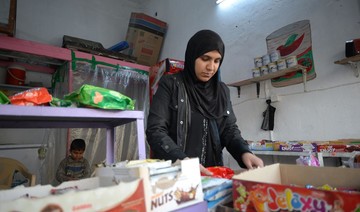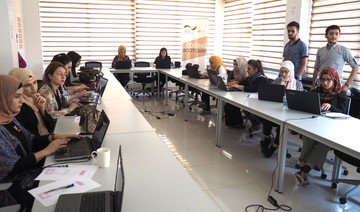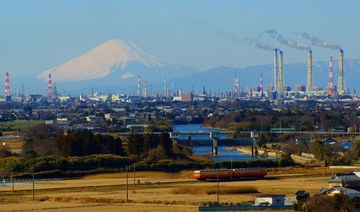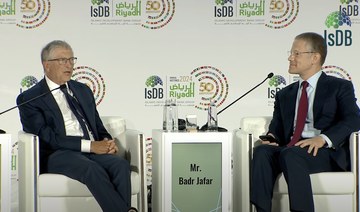BAGHDAD: Stuck between an endless waitlist for a government job and a frail private sector, Iraqi entrepreneurs are taking on staggering unemployment by establishing their own start-ups.
The first murmurs of this creative spirit were felt in 2013, but the Daesh group’s sweep across a third of the country the following year put many projects on hold.
Now, with Daesh defeated, co-working spaces and incubators are flourishing in a country whose unemployment rate hovers around 10 percent but whose public sector is too bloated to hire.
Many self-starters begin their journey at an aptly named glass building in central Baghdad: The Station.
There, they sip on coffee, peruse floor-to-ceiling bookshelves for ideas and grab a seat at clusters of desks where other stylish Iraqis click away at their laptops.
“We’re trying to create a new generation with a different state of mind,” said executive director Haidar Hamzoz.
“We want to tell youth that they can start their own project, achieve their dreams and not just be happy in a government job they didn’t even want,” he said.
Youth make up around 60 percent of Iraq’s nearly 40 million people.
After graduating from university, many spend years waiting to be appointed to a job in the government, Iraq’s biggest employer.
Four out of five jobs created in Iraq in recent years are in the public sector, according to the World Bank.
And in its 2019 budget, the government proposed $52 billion in salaries, pensions, and social security for its workers — a 15 percent jump from 2018 and more than half the total budget.
But with graduates entering the workforce faster than jobs are created, many still wait indefinitely for work.
Among youth, 17 percent of men and a whopping 27 percent of women are unemployed, the World Bank says.
When Daesh declared Mosul its seat of power in Iraq back in 2014, resident Saleh Mahmud was forced to shutter the city’s incubator for would-be entrepreneurs.
With Mosul now cautiously rebuilding after the militants were ousted in 2017, Mahmud is back in business.
“Around 600-700 youth have already passed by Mosul Space” to attend a seminar or seek out resources as they start their own ventures, said the 23-year-old.
He was inspired after watching fellow Mosul University graduates hopelessly “try to hunt down a connection to get a job in the public sphere.”
“A university education isn’t something that gets you a fulfilling job,” he said.
Another start-up, Dakkakena, is capitalizing on Mosul’s rebuilding spirit, too.
The online shopping service delivers a lorry-full of home goods every day to at least a dozen families refurnishing after the war.
“On the web, we can sell things for cheaper than stores because we have fewer costs, like no showrooms,” said founder Yussef Al-Noaime, 27.
Noaime fled Daesh to the Netherlands, where he was introduced to e-commerce. When he returned home, the computer engineer partnered with another local to found their venture.
A similar service, Miswag, was set-up in the capital Baghdad in 2014 and last year reported hundreds of thousands of dollars in profits.
On an autumn day, some 70 young Iraqi innovators converged for a three-day workshop in Baghdad on founding start-ups.
They flitted among round tables planning projects, their Arabic conversations sprinkled with English terms.
“What we’re doing is showing youth what entrepreneurship is — not necessarily so they succeed, but so they at least try,” said organizer Ibrahim Al-Zarari.
He said attendees should understand two things: first, that the public sector is saturated. And second, that oil isn’t the only resource on which Iraq — OPEC’s second-largest producer — should capitalize.
More than 65 percent of Iraq’s GDP and nearly 90 percent of state revenues hail from the oil sector. Many youths turn to it for work, but it only employs one percent of the workforce.
Widespread corruption and bureaucracy also weaken Iraq’s appeal for private investors. The World Bank ranks it 168th out of 190 for states with a good business environment.
Under current legislation, private sector employees are not offered the same labor protections or social benefits as those in the public sector.
And Iraq’s stuttering banking industry appears too cautious to dive in, said Tamara Raad, 26, who researches start-ups.
“The banks have a role to play. They must make loans without interest and help young entrepreneurs,” she said.
Banks or no banks, Mahmud in Mosul is already planning how he’ll grow his business in 2019.
“We will open a new, larger space for new gatherings,” he said excitedly, to bring together returning designers, developers and other inventors.
To fight off unemployment, Iraqi youth plant start-up seeds
To fight off unemployment, Iraqi youth plant start-up seeds
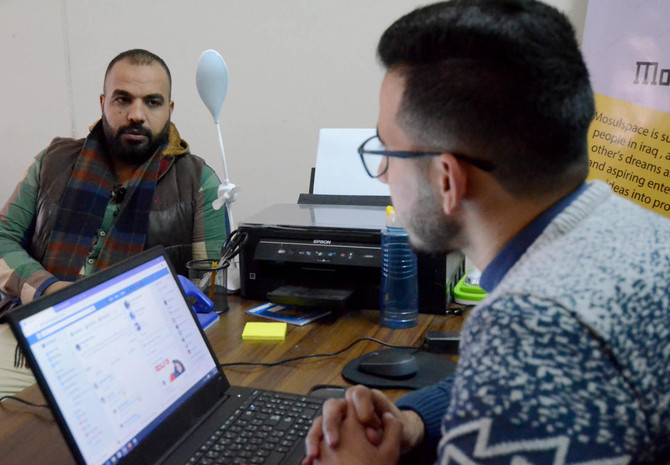
- Iraqi entrepreneurs are taking on staggering unemployment by establishing their own start-ups
- Under current legislation, private sector employees are not offered the same labor protections or social benefits as those in the public sector
Saudi banks’ funding profile changing on rising mortgage demand: S&P Global

RIYADH: Saudi banks are expected to pursue alternative funding strategies to deal with the rapid expansion in lending, fueled by the demand for new mortgages, according to S&P Global.
In its latest report, the credit-rating agency stated that the funding profiles of financial institutions in the Kingdom are set to undergo changes, primarily driven by a state-backed initiative to boost home ownership.
According to the analysis, mortgage financing represented 23.5 percent of Saudi banks’ total credit allocation at the end of 2023, compared to 12.8 percent in 2019.
“The ongoing financing needs of the Vision 2030 economic initiative and relatively sluggish deposits growth, is likely to incentivize banks to seek alternative sources of funding, including external funding,” said S&P Global.
The report also predicted that this pursuit of external funding could potentially impact the credit quality of Saudi Arabia’s banking sector.
According to the US-based rating agency, lending growth among Saudi banks has outpaced deposits, with the loan-to-deposit ratio exceeding 100 percent in 2022, up from 86 percent at the end of 2019.
S&P Global expects this trend to persist, particularly with corporate lending playing a more significant role in growth over the next few years. “We consider Saudi banks are likely to turn to alternative funding strategies to fund that expansion,” the report said.
It added: “We consider, however, that the risk created by the maturity mismatch is mitigated by the relative stability of Saudi deposits.”
The agency also predicted that Saudi banks’ foreign liabilities will continue to increase, rising from about $19.2 billion at the end of 2023 to meet the funding requirements of strong lending growth, particularly amidst lower deposit expansion.
The report highlighted that Saudi banks have already tapped international capital markets, and the credit rating agency expects this trend to continue for the next three to five years.
According to S&P Global, the Saudi banking system could transition from a net external asset position of SR42.9 billion, or 1.6 percent of lending, at the end of 2023 to a net external debt position within a few years.
In April, S&P Global, in another report, stated that banks in the Kingdom are anticipated to experience robust credit growth ranging between 8 to 9 percent in 2024.
The agency noted that this credit expansion will be propelled by corporate lending, fueled by increased economic activities driven by the Vision 2030 program.
Moreover, the report added that the Saudi government and its related entities are expected to inject deposits into the banking system, thereby supporting the credit growth of financial institutions in the Kingdom.
PIF’s tourism investment arm Asfar to develop the city of Hail as next destination, CEO reveals
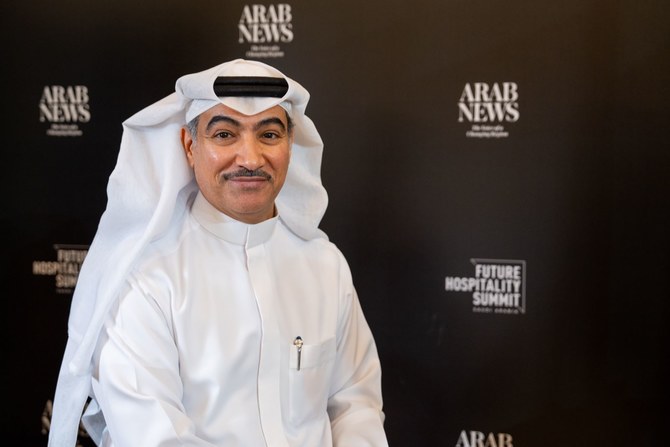
RIYADH: Saudi Arabia’s northwestern city of Hail will be the fifth destination development of Saudi Tourism Investment Co., the firm’s CEO has revealed.
Speaking to Arab News on the sidelines of the Future Hospitality Summit, Fahad bin Mushayt announced the plan, which comes after the activation of the company’s projects in Al-Baha, Yanbu, Al-Ahsa, and Taif.
The projects have all been launched within one year of the Public Investment Fund-owned firm – also known as Asfar – being unveiled.
The company is mandated to invest in new projects and develop attractive travel destinations, incorporating hospitality, tourist attractions, retail, and food and beverage offerings in cities across Saudi Arabia.
Bin Mushayt said: “In almost one year, Asfar is already playing in four destinations, with Hail coming soon, so I can reveal that.”
The entity is working to bridge the gap between the public and the private sector, as well as the local community, to create unique experiences that abide by the DNA of both the nation and the cities themselves, the executive noted.
This notion came to life during the summit, where the company signed a number of agreements with hospitality developers to launch four asset classes in the city of Yanbu.
Among them, Asfar announced the signing of investment agreements with Baheej, a joint venture between the company and the Tamimi-AWN alliance, as well as the Royal Commission for Yanbu.
“This morning, we announced our partnership with Curtain Hospitality, and they are going to be the operator of our resort in Yanbu, under the brand called Cloud 7. So the structure usually involves us and the developer as an investor, and they bring the know-how to build real estate and hospitality,” he said during the second day of the event.
The concept of Yanbu as Saudi Arabia’s most up-and-coming “second-tier city” was not limited to Asfar’s CEO alone.
Speaking on a panel at the summit alongside Mushayt, Abdulrahman Al-Bassam, a board member of Baheej, further emphasized these ideas, stating: “Yanbu is going to be the gateway of the new Red Sea Riviera, with four different asset classes expected to be operational by 2027.”
Adhering to its mandate, Asfar selects a different private sector partner to develop each of their destinations, the CEO explained, saying: “We are here to empower the private sector, to encourage them, to encourage them to go and invest with us. And we give them a lot of incentives.”
He acknowledged that those companies put their money into the subsidiary. However, Mushayt emphasized that they provide “a lot of incentives” as a semi-government entity empowered by PIF, the Ministry of Tourism, and the Ministry of Investment.
The PIF subsidiary utilizes a mix of domestic and foreign investments to empower its initiatives, focusing on operators that are suitable for the needs of the project, Mushayt said.
“The operator, if it’s a hotel operator, we bring a hotel operator; if it’s an adventure park operator, we bring a theme park. In fact, we have a theme park now, and we’re talking to international operators,” he said.
The Asfar CEO further revealed that they have a resort in Yanbu that would require cruises, “so we’re talking to Cruise Saudi, and we’re talking to another international player.”
He added: “It’s a mix of foreign and local operators, investors, and our hospitality management companies.”
HR development fund helps another 74k Saudis get private sector jobs, figures show

RIYADH: Almost 74,000 Saudi nationals received help securing private sector jobs in the first quarter of 2024 by the Kingdom’s Human Resources Development Fund.
The body supported the hiring of 73,878 citizens over the period, as offering advising, training, and empowerment services to more than 1.1 million individuals.
Additionally, during the same period, the organization provided services to more than 72,000 private sector firms across various industries throughout the Kingdom. Approximately 88 percent of these establishments were small and medium-sized businesses.
Saudi imports, exports increase despite regional tensions

RIYADH: Saudi Arabia’s imports and exports increased 5 percent in the first quarter of 2024 despite the tension in the region, according to a senior official.
In November 2023, the Saudi Ports Authority, known as Mawani, announced a 5.31 percent increase in container handling across all seaports in October. A total of 741,905 twenty-foot equivalent units were processed, compared to 704,486 a year before.
In an interview with Al-Ekhbariya TV channel on the sidelines of the Logistic Integration Forum 2024, held on April 29 in the Eastern Province, Minister of Transport and Logistic Services Saleh Al-Jasser noted that this growth stemmed from collaborative efforts between the public and private sectors.
IsDB Group annual meetings conclude with 85 agreements worth over $8bn
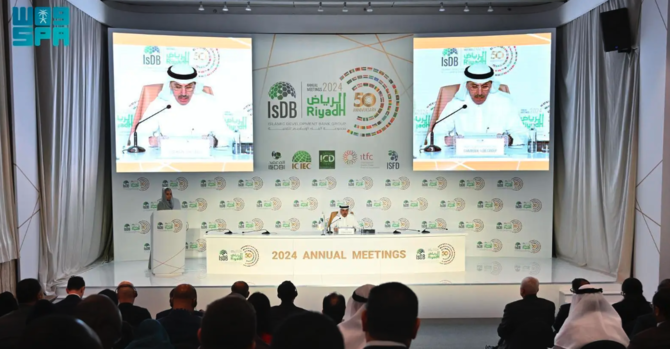
RIYADH: As many as 85 agreements worth over $8 billion were signed across diverse sectors during the recently concluded annual meetings of the Islamic Development Bank Group.
This stands in contrast to the last year’s meetings, which recorded only 77 financing agreements, totaling $5.4 billion.
Speaking at the concluding press briefing, IsDB Chairman Mohammed bin Sulaiman Al-Jasser disclosed the signing of financing agreements between the group's institutions, 38 member countries, and 22 international financial institutions, covering diverse projects.
He lauded the continuous backing of the group by Saudi leadership, citing it as a testament to the Kingdom’s commitment to global cooperation and advancement.
Highlighting the significance of this year’s gatherings, the chairman mentioned that they included meetings of the IsDB Group’s councils and over 27 consequential side events.
These sessions brought together distinguished intellectuals, experts, and researchers from various developmental domains, with a total of more than 3,750 participants.
Notably, representatives from approximately 55 international and regional partner organizations, including 23 institutional heads, were present.
Detailing the Private Sector Forum’s activities, Al-Jasser noted the participation of over 1,500 delegates from more than 60 nations. The forum, comprising 17 events, facilitated the signing of over 60 agreements amounting to approximately $6.5 billion.
Over the past 50 years, the IsDB has played a significant role in progress by funding developmental projects exceeding a total value of $182 billion, according to the chairman.
These projects have encompassed diverse vital areas, ranging from basic infrastructure and agriculture to various strategic sectors such as health, education and energy, as well as trade, and Islamic finance.
He emphasized that the discussions and exchanges during the meetings provided valuable insights and success stories crucial for fostering sustainable social and economic development. He affirmed that the outcomes would transform the IsDB’s future initiatives and strategic partnerships.
The issuance of the “Golden Jubilee Declaration” by the IsDB Board of Governors, acknowledging the bank’s pivotal role and achievements, was also highlighted by Al-Jasser.
The declaration outlined key future priorities, including enhancing governance, expanding concessional financing, and advancing Islamic finance and cooperation in Southern countries.
In conclusion, Al-Jasser reiterated the theme of the annual meetings – “Cherishing our Past, charting our Future: Originality, Solidarity and Prosperity” – underscoring its significance as a guiding principle for the IsDB’s trajectory.
He emphasized the organization’s commitment to drawing inspiration from past achievements, learning from historical lessons, and leveraging current challenges and opportunities to forge a brighter future.
Last year, the IsDB Group announced several projects with 24 member countries aimed at addressing pressing challenges hindering growth in the Global South, with a focus on health, agriculture, and food security, as well as initiatives targeting small and medium enterprises, education, and humanitarian assistance, among others.




